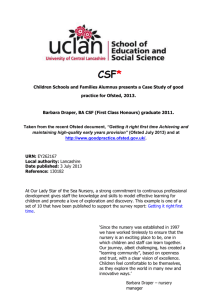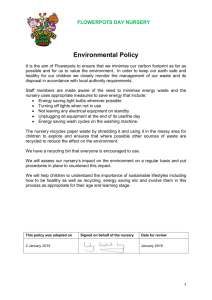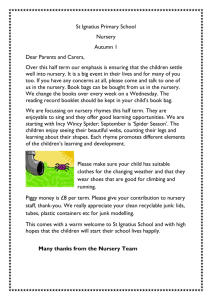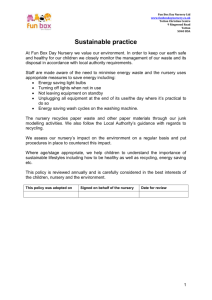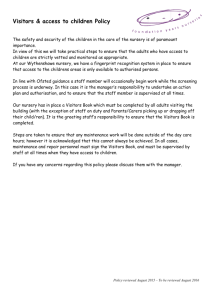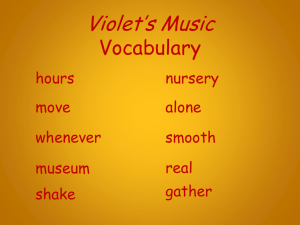here. - Inn Farm
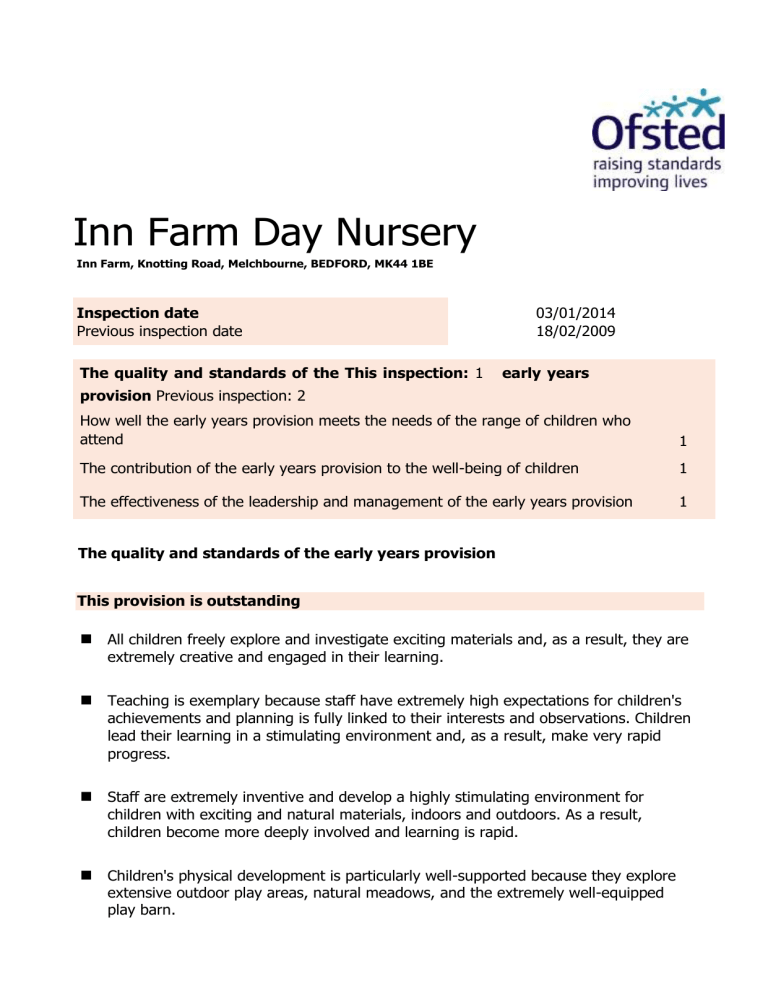
Inn Farm Day Nursery
Inn Farm, Knotting Road, Melchbourne, BEDFORD, MK44 1BE
Inspection date
Previous inspection date
03/01/2014
18/02/2009
The quality and standards of the This inspection: 1 early years
provision Previous inspection: 2
How well the early years provision meets the needs of the range of children who attend
The contribution of the early years provision to the well-being of children
1
1
The effectiveness of the leadership and management of the early years provision
The quality and standards of the early years provision
1
This provision is outstanding
All children freely explore and investigate exciting materials and, as a result, they are extremely creative and engaged in their learning.
Teaching is exemplary because staff have extremely high expectations for children's achievements and planning is fully linked to their interests and observations. Children lead their learning in a stimulating environment and, as a result, make very rapid progress.
Staff are extremely inventive and develop a highly stimulating environment for children with exciting and natural materials, indoors and outdoors. As a result, children become more deeply involved and learning is rapid.
Children's physical development is particularly well-supported because they explore extensive outdoor play areas, natural meadows, and the extremely well-equipped play barn.
Inspection report: Inn Farm Day Nursery, 03/01/2014 2 of 12
The manager is inspirational and engages staff in highly effective methods of performance management and professional development. Consequently, staff are motivated, committed and knowledgeable.
The nursery uses highly successful strategies to engage all parents within the nursery and offers valuable information for extending children's learning at home. They work extremely closely with all other agencies involved with children. As a result, children's learning is supported to the full.
Information about this inspection
Inspections of registered early years provision are:
scheduled at least once in every inspection cycle – the current cycle ends on 31 July
2016
scheduled more frequently where Ofsted identifies a need to do so, for example where provision was previously judged inadequate
brought forward in the inspection cycle where Ofsted has received information that suggests the provision may not be meeting the legal requirements of the Early Years
Foundation Stage or where assessment of the provision identifies a need for early inspection
prioritised where we have received information that the provision is not meeting the requirements of the Early Years Foundation Stage and which suggests children may not be safe
scheduled at the completion of an investigation into failure to comply with the requirements of the Early Years Foundation Stage.
The provision is also registered on the compulsory part of the Childcare Register. This report includes a judgment about compliance with the requirements of that register.
Inspection activities
The inspector observed activities in all rooms and the outside areas.
The inspector looked at a selection of policies, procedures and information provided
by the nursery.
Inspection report: Inn Farm Day Nursery, 03/01/2014
The inspector carried out a joint observation with the manager.
The inspector spoke with the owner, manager, staff and children at appropriate
times throughout the inspection.
The inspector reviewed a selection of children's observation and assessment
development files with key persons.
3 of 12
The inspector spoke with several parents and recorded their views of the nursery.
Inspector
Lynne Talbot
Full report
Information about the setting
Inn Farm Day Nursery was registered in 2008 and is on the Early Years Register and on the compulsory part of the Childcare Register. The nursery is privately owned. It operates from single storey buildings in the grounds of Inn Farm in Melchbourne, Bedfordshire. The nursery is accessible to all children and there are enclosed areas available for outdoor play.
The nursery employs 15 members of childcare staff. Of these, 14 hold appropriate early years qualifications at level 2, 3 and 4. The nursery opens Monday to Friday for 52 weeks of the year, excluding bank holidays. Sessions are from 8am to 6pm. Children attend for a variety of sessions. There are currently 69 children attending in the early years age group.
The nursery provides funded early education for two-, three- and four-year-old children. It supports a number of children with special educational needs and/or disabilities and children who speak English as an additional language.
What the setting needs to do to improve further
To further improve the quality of the early years provision the provider should:
consider continuing to extend the excellent outdoor learning environment even further, by increasing opportunities for children to work cooperatively in the natural environment.
Inspection report: Inn Farm Day Nursery, 03/01/2014
Inspection judgements
4 of 12
How well the early years provision meets the needs of the range of children who
attend
Staff in the nursery demonstrate an excellent awareness of how children learn and are extremely responsive to their developing interests. As a result of excellent teaching, the children are highly motivated and show an enthusiasm for learning which results in them making rapid progress in their development. For example, children are encouraged to lead an activity within a farm yard. They decide that they need water to add to the sawdust and sand to make it more realistic. Children are supported to choose how to fetch this and they decide on a small pot with a lid to stop them from spilling the water. They show their emerging skills as they talk of needing the light on in the bathroom because it is dark.
Children add model animals to the play telling staff that 'the elephants need a bath!'. Later they discover that the sand in their small pot has sunk but the wood shavings are floating.
Staff gently suggest that they explore this further in the large water tray and, as a result, children continue to be highly engaged in their own learning.
Staff plan first hand experiences and challenges that greatly enhance children's learning and development. For example, all children engage in stimulating creative activities with a vast range of tactile materials. Younger babies and toddlers eagerly investigate new materials and take part in safe science experiments. For example, soap flakes and water, when left to solidify, provide a material which appears firm but, when handled, becomes viscous. Children eagerly squeeze and experiment with making bubbles and pouring the gelatinous material describing it as slimy and slippery. Children independently make decisions when building with boxes. They are supported to solve problems themselves by staff who use excellent teaching to help them to think things through. For instance, they ask, 'how might you fix that to make it stronger?' and urge children to consider why their first attempts had failed. In this way children predict and test their own ideas to reinforce the learning. A vast array of heuristic play opportunities are used by exceptionally supportive staff whose vocal encouragement and close attention maximises the learning opportunities. Staff fully understand the characteristics of learning and create a highly stimulating environment for children with exciting materials and challenging activities. For example, children love to make treasure maps and write and draw confidently. Staff plan
'Pirate days' where children follow a trail of gold coins to find a treasure chest filled with coins and jewels. As a result, children are actively learning and working collaboratively.
When practising making marks, children show clear confidence. For instance, they write their names independently, use phonics to predict how to spell some simple words, and tell staff the initial letters of some words. For example, they tell staff that 'you begins with
'y', I can write that'. Children are very confident with early technology. They programme simple robots, entering both estimated distances and directions, showing that they have good recall of sequences of instructions. Staff teaching is exceptional because these resources are designed to foster free exploration yet link to specific learning. This means that children are extremely well-prepared for their future school experiences.
Observation and assessment is sharply focused and builds from an initial assessment completed by staff and parents in partnership. Individual programmes for each child
Inspection report: Inn Farm Day Nursery, 03/01/2014 5 of 12 identify their next steps and their progression is tracked closely. Daily and weekly evaluation of the observations made, and how these have informed the planning, continue to ensure that every child is challenged. Parents are fully involved in the learning; regular consultations keep them fully informed. Parents complete 'at home' observations which help to inform the planning. Achievement aims with suggested activities are shared with parents ensuring they can contribute to their child's learning and ideas for activities at home are provided to enhance children's learning. Daily verbal exchange is a key part of the sharing process and enhances the close monitoring of children's learning and development. Children with special educational needs and/or disabilities, or English as an additional language, receive extremely detailed and well-planned support to ensure that they make rapid progress given their starting points. The staff work closely with all agencies involved and any specific programme is closely followed to support children to meet their next steps and objectives in all areas of learning and development. The manager closely monitors the progress of all children thereby ensuring that early intervention is used for any child, where necessary, to support learning.
Children show an extremely strong urge to learn about each other's culture and the world around them. This is because staff fully embed an understanding of others throughout all aspects of the nursery day, in all areas. For example, children enjoy the Spanish language and foods shared with them by a Spanish speaking member of staff. Parents visit to share cooking, photographs and music from Mexico, France and Italy. Children love to learn about each other's home languages and celebrations. For example, the Norwegian and
German languages are shared, as are religious festivals, such as Hanukkah, with a parent visiting to talk about the lighting of candles. The nursery children sponsor two children in
Ghana. They display, and discuss, photographs of life in Ghana for these children and carry out planting in the garden to compare the differences between what can be grown in different climates. This full inclusion and positive approach towards cultural awareness means, that children learn from each other and seek out new experiences. Children show that they are well-motivated and very eager to join in; they consistently demonstrate excellent characteristics of effective learning. Staff are particularly supportive and, as a result, the children confidently display their knowledge, solve problems, and initiate activities. This means that they are practising in preparation for new learning within any new setting, such as school.
The contribution of the early years provision to the well-being of children
The key persons in this nursery are particularly attentive and form excellent relationships with children and families and, as a result, children form close bonds and attachment with them. High ratios of staff to children, and small groups which interact throughout the day, mean that children are very settled and content in all areas of the nursery. Each child and parent is introduced to the nursery at their own pace using a very clear induction process.
Complementary settling-in sessions, together with an assigned key person, are used to help the introduction of children and families into the nursery. A document entitled, 'Look at me now' is completed with all welfare and care needs, as well as current learning and development and any previous information that is vital for establishing starting points.
These methods add to the close bonds made between the key person, child and family, and underpin the relationship. Staff model excellent social behaviour for children and offer
Inspection report: Inn Farm Day Nursery, 03/01/2014 6 of 12 them frequent praise throughout the day. Children understand that they are all respected as individuals. A vast number of celebrations are explored by all children, from the youngest baby to the pre-school children. Staff work extremely closely with all parents to learn as much as they can about children's family and culture. These highly effective methods all help children to understand their feelings and know that they are valued.
Children show excellent self-care skills and develop a very secure understanding of healthy eating. They are very well nourished and their health is fostered. The cook delivers an exciting menu that is freshly cooked and which accommodates every child's specific need.
Detailed personal healthcare plans are implemented to ensure that dietary needs are closely observed.
Children develop excellent physical health. Younger babies and toddlers have their own extensive garden area which has a roof and safe surface. This means that a vast array of continuous provision is available to them at all times. Other garden areas offer extensive facilities for natural and exploratory play for quality play in inclement weather. For example, the main area has a soft surface and is equipped with an abundance of opportunities including a vast 'beach' area, and an 'Olympics' area which builds on many sports. In addition, children have a large meadow where they investigate the natural world, invite insects to the 'bug hotel', care for the chickens and collect eggs, and follow the trails through the extensive meadow. Furthermore, children access the 'play barn' where, in addition to exploring physical activities, such as the castle, they take part in
'Teddy Tennis', 'Yoga bugs' or Pilates with visiting specialists or trained staff. These help them to explore physical movement and activity extensively, for good health. However, there is scope to develop the outdoor area even further, by increasing opportunities for children to work cooperatively together to build structures from natural resources, such as wood, leaves and bark.
Children's understanding of safety is promoted significantly and they take part in a road safety week each year. Children learn to take risks within a safe environment. For example, they use guttering and pipes to build tracks in the garden, climb in and out of tyres in the extensive outdoor area with soft safety surface, and use the large climbing frame in the paddock in small groups to enhance safety. Children are encouraged to think of safety in the wider environment using resources accessed from the local road safety team. Visits from the local police and fire service are arranged to talk to the children about safety. Children's moves between rooms are extremely well-planned to ensure that they are settled and ready for the move. The staff use detailed progress summary packs and the key persons work closely together to support the child through the process. This ensures that children's security is promoted to the optimum level. Children are prepared extremely well for any move to school. Their independence is emphasised and activities focus on the exciting forthcoming move. The nursery obtain photographs of the many schools and invite teachers to visit the children in nursery to support the move. As a result of these steps, all children are extremely well-prepared for school or a move to another room in the nursery.
The effectiveness of the leadership and management of the early years provision
Inspection report: Inn Farm Day Nursery, 03/01/2014 7 of 12
The manager and owner have very high expectations for the quality of care that is offered to children and families. Regular and robust reviews of all paperwork and procedures take place to ensure that all requirements of the Statutory framework for the Early Years
Foundation Stage are met. Arrangements to safeguard children within the setting are particularly robust. All staff have mandatory safeguarding training and it is reviewed at every team meeting. There are extremely clearly mapped procedures for monitoring any safeguarding concern within the setting. The manager and deputy ask staff spontaneous questions, with set scenarios, to gauge their continued understanding of safeguarding procedures. There are also extremely thorough recruitment and suitability checks, which include a detailed induction and probationary period for new staff. The interview process is particularly robust with applicants required to complete a trial with specific tasks designed to demonstrate their understanding of excellent practice. New staff have a
'buddy' as a mentor and have a clearly outlined professional progression path developed.
As a result, the nursery ensures that children are completely protected. Staff create an environment that is stimulating where children engage in active learning. The environment is especially safe. External doors are kept locked; parents ring the doorbell and are admitted by staff members. The grounds have secure high gates preventing any access to the external play areas and meadows accessed by children during core hours. These measures demonstrate the high regard that the nursery has for the security and safety of the children. The manager has a clear overview of what is taking place in all areas, at all times, through constant monitoring throughout the day. Hence, children's welfare and well-being is shown to be of the utmost priority.
High-quality professional supervision is provided in the form of very regular observation and feedback by the manager, every second month, and an annual appraisal review. Peer observations are also completed frequently enabling every staff member to work with each other towards continuous professional development. In-house training is extremely frequent and the National Strategies documents in support of outstanding practice are used to reflect on staff knowledge and understanding. A training coordinator is instrumental in sourcing an extensive programme of training for the staff team. These methods feed directly to a targeted programme of professional development for the already first-rate staff members. Extremely thorough reflective practice includes input from the manager and owner, staff, parents and carers, and children. A focused improvement plan is used for all areas with staff involved in evaluating all practice in their areas and forming an action plan to demonstrate a commitment to continuous improvement. Senior staff meet each month to review the development plans which feed into the overall reflective working document for the nursery. Several external professional advisors are invited into the nursery to help with reflective practice. The nursery staff also attend Early Years cluster meetings and visit other nurseries to continue to consider best practice. The manager demonstrates that she has an excellent awareness of how to monitor and evaluate staff practice and the educational programme to ensure children progress in their individual learning. For example, each month the progress of particular groups of children are monitored, such as the older or younger children, or those attending full time against those attending part time, to establish whether progress is consistently better than or lower than others. Group action plans are put into place to address anything the monitoring identifies and this is reviewed the following month. This further assists the nursery to examine all areas of its practice and strive towards ongoing exemplary standards.
Inspection report: Inn Farm Day Nursery, 03/01/2014 8 of 12
Parents are highly involved in the practice of the setting. For instance, the 'parents as partners' representative works closely with the manager, and parental views are sought via the parent representatives. Questionnaires to parents are used frequently, including following a consultation evening to assess the value of such evenings to parents. Parents report that they are fully involved in any individual education plan to support children with special educational needs and/or disabilities. As a result of these clearly embedded methods of working with parents, their feedback helps to drive the continuous methods that maintain the high levels of achievement. The extremely close work with all other agencies involved with children means that children's needs are quickly identified and extremely well met. The nursery is instrumental in establishing links with other key agencies. The partnerships with other settings that children attend are enhanced by shared care documents that help the key person in both placements develop learning programmes to fully meet children's needs. Where external advisors are involved, children are visited in both placements to support shared programmes. In this way the shared information fully promotes continuity in learning. The dedication seen in reflecting on excellent practice and continuing to improve all aspects of the setting shows that there is a strong drive to maintain the high levels of achievements. Children are exceptionally secure and confident, and thoroughly enjoy their play and learning. Consequently, children embark on their learning career ready to seek out new experiences and learn.
The requirements for the compulsory part of the Childcare Register are
The Childcare
Register
Met
Inspection report: Inn Farm Day Nursery, 03/01/2014
What inspection judgements mean
9 of 12
Registered early years provision
Grade Judgement Description
Grade 1 Outstanding Outstanding provision is highly effective in meeting the needs of all children exceptionally well. This ensures that children are very well prepared for the next stage of their learning.
Grade 2 Good Good provision is effective in delivering provision that meets the needs of all children well. This ensures children are ready for the next stage of their learning.
Grade 3 Requires improvement
The provision is not giving children a good standard of early years education and/or there are minor breaches of the safeguarding and welfare requirements of the Early Years
Foundation Stage. It will be monitored and inspected within twelve months of the date of this inspection.
Grade 4 Inadequate Provision that is inadequate requires significant improvement and/or enforcement action. The provision is failing to give
Met children an acceptable standard of early years education and/or is not meeting the safeguarding and welfare requirements of the Early Years Foundation Stage. It will be monitored and inspected again within six months of the date of this inspection.
The provision has no children on roll. The inspection judgement is that the provider continues to meet the requirements for registration.
Not met The provision has no children on roll. The inspection judgement is that the provider does not meet the requirements for registration.
Inspection
This inspection was carried out by Ofsted under sections 49 and 50 of the Childcare Act
2006 on the quality and standards of provision that is registered on the Early Years
Register. The registered person must ensure that this provision complies with the statutory framework for children’s learning, development and care, known as the Early
Years Foundation Stage.
Inspection report: Inn Farm Day Nursery, 03/01/2014
Setting details
10 of 12
Unique reference number
Local authority
Inspection number
Type of provision
Registration category
Age range of children
Total number of places
Number of children on roll
Name of provider
EY373261
Bedford Borough
858174
Childcare - Non-Domestic
0 - 8
62
69
Kathleen Therese Foster-Collier
18/02/2009
01234 708655
Date of previous inspection Any complaints about the inspection or the report should be made following the procedures set out
Telephone number in the guidance ‘Complaints procedure: raising concerns and making complaints about Ofsted’, which is available from Ofsted’s website: www.ofsted.gov.uk. If you would like Ofsted to send you a copy of the guidance, please telephone 0300 123 4234, or email enquiries@ofsted.gov.uk.
Type of provision
For the purposes of this inspection the following definitions apply:
Full-time provision is that which operates for more than three hours. These are usually known as nurseries, nursery schools and pre-schools and must deliver the Early Years
Foundation Stage. They are registered on the Early Years Register and pay the higher fee for registration.
Sessional provision operates for more than two hours but does not exceed three hours in any one day. These are usually known as pre-schools, kindergartens or nursery schools and must deliver the Early Years Foundation Stage. They are registered on the Early Years
Register and pay the lower fee for registration.
Childminders care for one or more children where individual children attend for a period of more than two hours in any one day. They operate from domestic premises, which are usually the childminder’s own home. They are registered on the Early Years Register and must deliver the Early Years Foundation Stage.
Inspection report: Inn Farm Day Nursery, 03/01/2014 11 of 12
Out of school provision may be sessional or full-time provision and is delivered before or after school and/or in the summer holidays. They are registered on the Early Years
Register and must deliver the Early Years Foundation Stage. Where children receive their
Early Years Foundation Stage in school these providers do not have to deliver the learning and development requirements in full but should complement the experiences children receive in school.
Inspection report: Inn Farm Day Nursery, 03/01/2014 12 of 12
The Office for Standards in Education, Children's Services and Skills (Ofsted) regulates and inspects to achieve excellence in the care of children and young people, and in education and skills for learners of all ages. It regulates and inspects childcare and children's social care, and inspects the Children and Family
Court Advisory Support Service (Cafcass), schools, colleges, initial teacher training, work-based learning and skills training, adult and community learning, and education and training in prisons and other secure establishments. It assesses council children’s services, and inspects services for looked after children, safeguarding and child protection.
If you would like a copy of this document in a different format, such as large print or Braille, please telephone 0300 123 4234, or email enquiries@ofsted.gov.uk.
You may copy all or parts of this document for non-commercial educational purposes, as long as you give details of the source and date of publication and do not alter the information in any way.
To receive regular email alerts about new publications, including survey reports and school inspection reports, please visit our website and go to ‘Subscribe’.
Piccadilly Gate
Store St
Manchester
M1 2WD
T: 0300 123 4234
Textphone: 0161 618 8524
E: enquiries@ofsted.gov.uk
W: www.ofsted.gov.uk
© Crown copyright 2012

